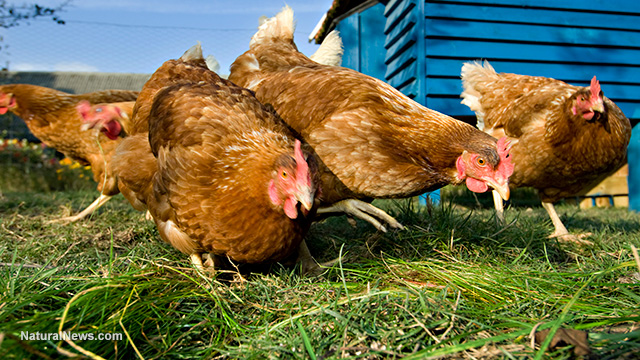Backyard chicken coops may ward off disease-carrying mosquitoes
Tuesday, July 26, 2016 by: David Gutierrez, staff writer
Tags: mosquitoes, malaria, chickens

(NaturalNews) A major species of malaria-carrying mosquito avoids the smell of chickens, according to a new study conducted by researchers from the Swedish University of Agricultural Sciences and Addis Ababa University in Ethiopia, published in Malaria Journal.
The study suggests that living in close proximity to chickens may help protect against malaria and other mosquito-borne illnesses.
"We were surprised to find that malaria mosquitoes are repelled by the odors emitted by chickens," co-author Rickard Ignell said.
"This study shows for the first time that malaria mosquitoes actively avoid feeding on certain animal species, and that this behavior is regulated through odor cues."
Mosquitoes refuse to bite chickens
In the first part of the study, the researchers collected population numbers on humans and domestic animals in three Ethiopian villages. They also trapped mosquitoes and tested them to determine what species they had recently fed from.The study was performed on the mosquito species Anopheles arabiensis, one of the major sub-Saharan vectors of malaria.
The researchers found that A. arabiensis preferentially feeds on human beings and prefers to live indoors. When outdoors, however, the mosquito will also drink blood from cattle, sheep and goats. Not a single mosquito was found to have fed from chickens, however, despite the fact that the fowl were prevalent in all three villages.
The researchers concluded from this survey that chickens are not a host species for A. arabiensis, and that therefore the mosquitoes must have some mechanism for identifying chickens in order to avoid them.
To test whether the odor of chickens might repel the mosquitoes, the researchers set up mosquito traps in several separate houses. They had a single human volunteer sleep under an untreated mosquito net beneath each trap, in order to draw mosquitoes in.
Eleven of the traps were filled with chicken feathers, while a live chicken was suspended beneath another trap. Other traps were filled with human hair, wool, or non-chicken bird feathers to serve as a control.
The researchers found that after 11 days, significantly fewer mosquitoes had been caught in the traps with chicken feathers, or in the one that had a live chicken nearby.
The researchers suggested that homes with live chickens or chicken feathers inside them might be less likely to be visited by mosquitoes. Since many people in the villages studied do in fact bring livestock into the house at night, the suggestion is one that could easily and quickly be implemented.
Natural malaria control measures urgently needed
Although malaria rates have recently begun dropping, there are signs that this victory may be short-term. The parasite is rapidly evolving multi-drug resistance in southeast Asia, sparking fears that drug containment efforts may soon falter."The risks are significant," said Robert Newman, director of the WHO's Global Malaria Program, in 2013.
"If history is any guide, if we were not to contain this problem then it is very likely to spread elsewhere," he said. "Especially risky is to sub-Saharan Africa [sic] ... this really would be a public health catastrophe."
Meanwhile, the mosquitoes that transmit the parasite continue to resist eradication efforts. A. arabiensis has been particularly difficult to control.
"People in sub-Saharan Africa have suffered considerably under the burden of malaria over an extended period of time and mosquitoes are becoming increasingly physiologically resistant to pesticides, while also changing their feeding habits, for example, by moving from indoors to outdoors," Ignell said.
"For this reason there is a need to develop novel control methods."
Further research will be needed to determine whether specific mosquito-repelling scents can be isolated from chicken feathers, and whether the smell of chickens also repels mosquitoes that carry other diseases, such as West Nile Virus or dengue.
Backyard chickens may help keep mosquitoes away from your home, but for when you go out into nature, try the Health Ranger's Bugs Away Spray from the Natural News Store. This repellent spray is free of synthetic chemicals or fragrances, containing only organic witch hazel and essential oils.
Sources for this article include:
Seeker.com
ScienceDaily.com
NaturalNews.com
Mosquitoes at FETCH.news
Get independent news alerts on natural cures, food lab tests, cannabis medicine, science, robotics, drones, privacy and more.
Take Action: Support Natural News by linking to this article from your website
Permalink to this article:
Embed article link: (copy HTML code below):
Reprinting this article:
Non-commercial use OK, cite NaturalNews.com with clickable link.
Follow Natural News on Facebook, Twitter, Google Plus, and Pinterest
- Newly released JFK files reveal Pentagon's role in creating Lyme disease and covid in the same lab
- Dr. Suzanne Humphries makes bombshell appearance on Joe Rogan podcast, exposing vaccine industry deception back to POLIOMYELITIS
- L.A.'s rebuilding nightmare: Only 4 permits issued after fire destroys 6,000 homes
- Discovery of vast underground city beneath Giza pyramids challenges human history
- Black cumin seed oil emerges as a powerful ally against breast cancer and chronic inflammation
- Catastrophic 7.7 earthquake devastates Myanmar and Thailand; death toll could reach 100,000
- AI breakthrough slashes celiac disease diagnosis time from months to minutes
- The hidden battle in your glass: How A1 and A2 milk could shape your health
- Sugar-free deception: Artificial sweeteners hijack hunger signals, fuel obesity epidemic, study warns
- Europe braces for WAR as EU urges citizens to STOCKPILE FOOD, in latest provocations with Russia
- Putin vows to 'finish off' Ukraine, accuses West of prolonging the war
- Thomas Massie’s Dual Loyalty Disclosure Act aims to restore American sovereignty by cracking down on foreign influence in Congress
- Aluminum pollution: A silent threat to human health
- Tesla owners under siege: Road rage, vandalism and political backlash fuel fear among drivers nationwide
- Chaos in Amsterdam: Five injured in broad daylight knife attack near Dam Square
- "Feel G.O.O.D. Gut Health Program" on BrightU: Dr. Basima Williams introduces the Feel-Good Plate Method
- Trump's 25% auto tariffs: A bold move to strengthen U.S. manufacturing despite short-term challenges
- The cancer fear industry: How big pharma profits from panic-and what natural alternatives offer
- Newly released JFK files reveal Pentagon's role in creating Lyme disease and covid in the same lab
- Analysis: The coming economic collapse, a mass uprising and Trump's three secret weapons to halt the growing revolt
- Trump nominates VACCINE ZEALOT Susan Monarez to lead the CDC, sidelining RFK Jr.'s reform efforts
- Trump's greatest betrayal so far: Accelerating Middle East wars, silencing dissent, and serving Zionist masters
- Dr. Mike Yeadon releases 15-minute testimony - WATCH - about genocidal intent of COVID “vaccines”
- Festive flavors: The sweet history, nutritional profile and health benefits of pecan pie
- Elon Musk: Aliens could be here on Earth RIGHT NOW
- Big Pharma's $8 Billion bribery scheme exposed: how doctors are pushed to prescribe junk science, not heal
- 5 Simple steps to boost your brainpower: How to strengthen executive function in a distracted world
- Trump reverses course on Gaza plan, says “nobody is expelling Palestinians”
- A lack of integrity in Academia: Harvard professor found GUILTY of fraudulent research to promote CRT theory
- Reclaim your health: How midlife exercise reverses years of inactivity
- Survival 101: Effective EMF blocking techniques
- Florida takes a stand: DeSantis proposes permanent ban on mRNA vaccine mandates
- Sugarcane extract superior to cholesterol-lowering drugs?
- California's social media censorship law struck down: A victory for free speech or a threat to online safety?
- OpenAI whistleblower who dissented against how the company trained ChatGPT found dead
- EPA advisor admits the agency is funneling billions to climate groups ahead of Trump’s return to White House
- EPA advisor admits the agency is funneling billions to climate groups ahead of Trump’s return to White House
- Newly released JFK files reveal Pentagon's role in creating Lyme disease and covid in the same lab
- California's social media censorship law struck down: A victory for free speech or a threat to online safety?
- Dr. Mike Yeadon releases 15-minute testimony - WATCH - about genocidal intent of COVID “vaccines”
- The Health Ranger releases “Vaccine Zombie” song and music video, using AI-animated zombies for the music video
- The pandemic as a tool for INDOCTRINATION: Understanding “The Indoctrinated Brain” by Dr. Michael Nehls
- Florida takes a stand: DeSantis proposes permanent ban on mRNA vaccine mandates
- “Why we influenced the 2020 elections”: Facebook files reveal the coordinated effort to bury the Hunter Biden laptop story
- Mike Adams releases country western hit single: Goin’ Back in Time is Comin’ Home
- Mike Adams releases music poetry sensation: A Child of God
- Unpacking the Lies That We’ve Been Fed – new song and music video released by Mike Adams, the Health Ranger
- Michigan sheriff announces criminal investigation into 2020 election crimes, Dominion Voting Systems
- Migrants are taking advantage of recent hurricanes to scam residents and loot their homes
- House Intelligence Committee calls for the ARREST and PROSECUTION of Dr. Anthony Fauci
- RFK Jr. clears key hurdle: Sen. Susan Collins backs controversial HHS nominee, signaling a new era for health policy
- Rep. Nancy Mace introduces bill to ban biological males from female facilities on federal property
- Peter Rost exposes Big Pharma corruption in his book “The Whistleblower: Confessions of a Healthcare Hitman”
- Mike Adams releases new song and music video: Nothing More Disgusting Than a Globalist
- Red Cross issues warning to stop blood plasma donations from vaccinated people
- Scientists confirm: GENIUS brain function can be spontaneously unleashed in humans without any apparent cause
- EPA advisor admits the agency is funneling billions to climate groups ahead of Trump’s return to White House
- HYSSOP: What research reveals about the health benefits of this ancient holy herb
- Two containers with completed ballots fall out of truck in Florida
- Fully vaccinated about to see “tsunami” of illness and death, warns virologist
- Global leaders unite to clamp down on “misinformation” with UN-backed Cascais Declaration
- BREAKING: 2025 NDAA authorizes mandatory military draft of WOMEN across America… as Pentagon pursues global NUCLEAR war with both Russia and China at the same time
- Michael Yon warns of a ZIONIST TAKEOVER in Trump’s second administration
- BOMBSHELL: DNA testing kits are a SCAM to develop ethnic-specific bioweapons
- Ozempic and Wegovy weight loss drugs are injectable LIZARD VENOM PEPTIDES that may unleash a devastating wave of organ failure… side effects align with symptoms of SNAKE BITES
- Israeli soldiers accused of even more torture and abuse in the West Bank
- These 13 countries just signed an agreement to engineer a global FAMINE by destroying food supply
- NASA admits that climate change occurs because of changes in Earth’s solar orbit, and NOT because of SUVs and fossil fuels
- RFK Jr. clears key hurdle: Sen. Susan Collins backs controversial HHS nominee, signaling a new era for health policy
- Sermon 30: How Jesus reveals Caesar’s FAKE CURRENCY and FALSE AUTHORITY
- Coriander seeds: Ancient medicine backed by modern science
- Arizona officials claim Maricopa County needs 10-13 days to tabulate results of the election
Science News & Studies
Medicine News and Information
Food News & Studies
Health News & Studies
Herbs News & Information
Pollution News & Studies
Cancer News & Studies
Climate News & Studies
Survival News & Information
Gear News & Information
News covering technology, stocks, hackers, and more



"Big Tech and mainstream media are constantly trying to silence the independent voices that dare to bring you the truth about toxic food ingredients, dangerous medications and the failed, fraudulent science of the profit-driven medical establishment.
Email is one of the best ways to make sure you stay informed, without the censorship of the tech giants (Google, Apple, Facebook, Twitter, YouTube, etc.). Stay informed and you'll even likely learn information that may help save your own life."
–The Health Ranger, Mike Adams












































